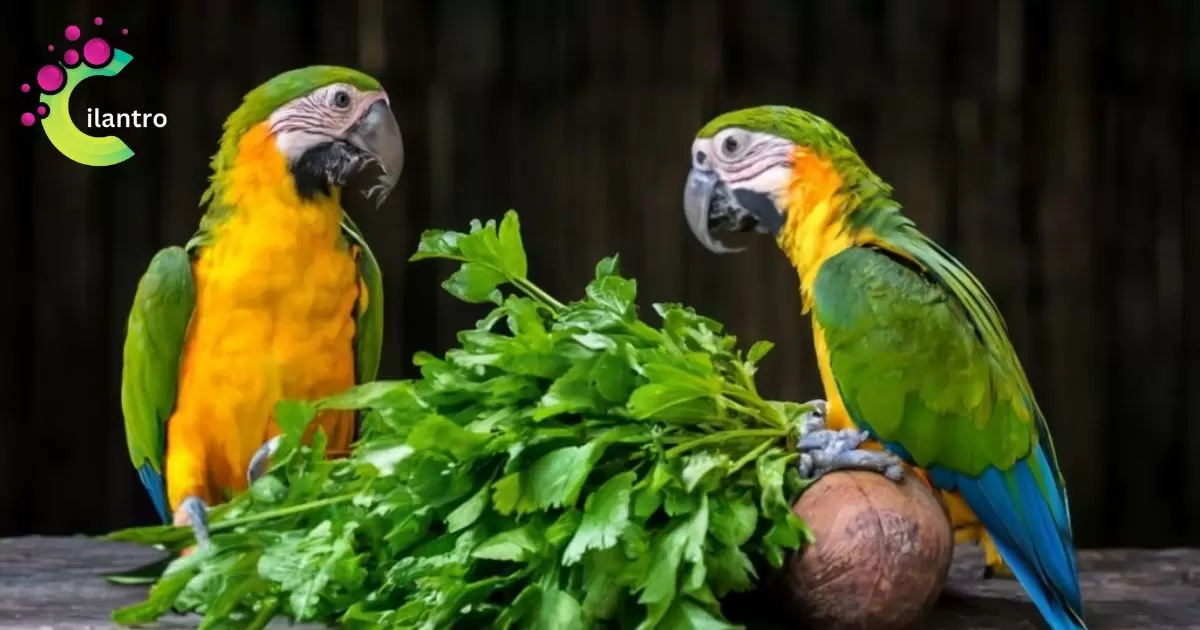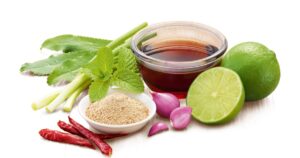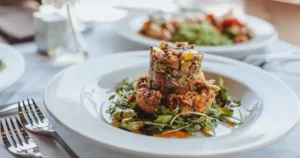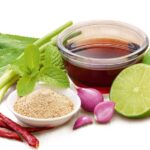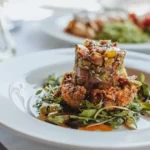Parrots enjoy munching on cilantro, savoring its fresh and flavorful taste. The vibrant green herb adds a tasty touch to their diet, making mealtime a delightful experience for these colorful birds.
Curious about feeding your feathered friend cilantro? Discover whether parrots can safely enjoy this herb or if it poses any risks. Uncover the truth about cilantro and keep your parrot’s diet both delightful and safe. The question is here, Can parrots eat cilantro? Yes, sure. Parrots can eat cilantro safely. It’s a nutritious herb that adds variety to their diet. Just ensure it’s fresh and clean before offering it to your feathered friend.
Parrots can eat cilantro safely. It’s a fresh herb that adds flavor to their diet. Rich in vitamins and antioxidants, cilantro is a healthy treat for them. However, moderation is key, as excessive amounts may upset their stomach. Always consult with a vet to ensure a balanced and safe diet for your feathered friend.
In this article, we’ll explore whether cilantro is safe for parrots and delve into any potential benefits or risks associated with its consumption, so stay tuned with us!
The Nutritional Profile of Cilantro
It is also known as coriander in some regions and is an herb with a distinctive flavor widely used in various cuisines. Before we address its safety for parrots, let’s examine its nutritional profile. Cilantro, which is sometimes referred to as cilantro acidic, is rich in vitamins A and K, as well as antioxidants.
It also contains small amounts of essential minerals like potassium, calcium, and phosphorus. Understanding the nutritional content is crucial in evaluating whether cilantro can contribute positively to a parrot’s diet.
Parrots eat cilantro, and considering its nutritional profile, incorporating this herb into their diet may offer additional benefits.
Parrots eat Cilatro?
The good news is that cilantro is generally safe for parrots when given in moderation. In fact, many parrots enjoy the taste, and parrots eat cilantro can benefit from the nutrients it provides. However, there are a few considerations to keep in mind:
Pesticide-Free Cilantro
It’s crucial to offer organic cilantro to your parrot, free from pesticides and other harmful chemicals. Pesticide residues can pose health risks to birds, so always wash cilantro thoroughly or opt for organic varieties.
Moderation is Key
While cilantro can be a healthy addition to a parrot’s diet, moderation is essential. Too much of any food item, even a nutritious one, can lead to imbalances in the bird’s overall nutrition.
How Much Cilantro Can Parrots Eat?
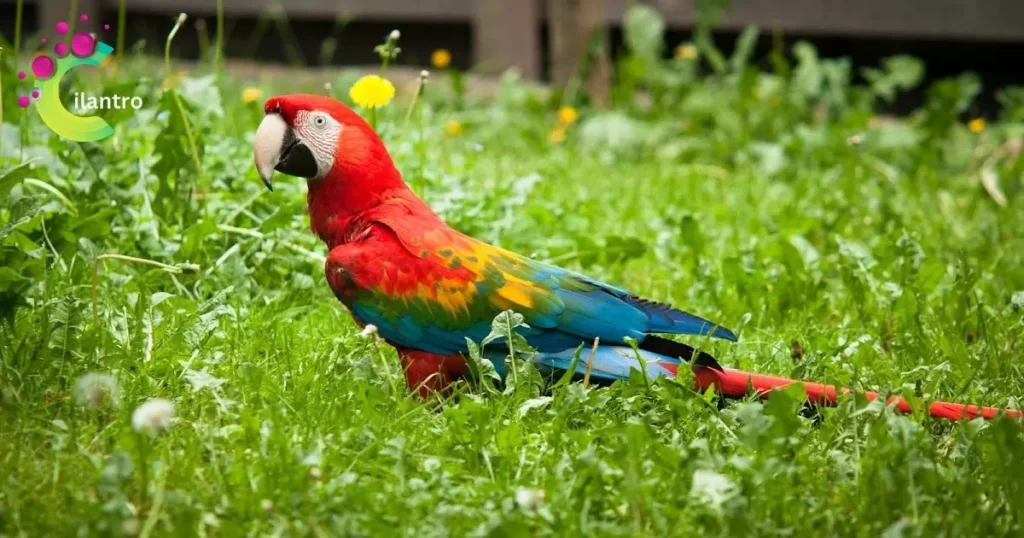
Parrots can enjoy cilantro in moderation. Parrots eat cilantro. It is advisable to offer small, chopped amounts as part of their daily diet. This helps prevent overconsumption and ensures that your parrot receives a balanced intake of nutrients from various food sources.
Cilantro in Parrot Diets: A Dietary Perspective
Parrots require a well-balanced diet for optimal health. Parrots eat cilantro. While cilantro can be a nutritious addition, it should not replace essential components of their diet. Let’s explore how cilantro fits into the broader context of a parrot’s nutritional needs.
Balancing Cilantro with Other Foods
While cilantro contributes certain vitamins and minerals, it’s important to balance its inclusion with other foods. Ensure that your parrot’s diet includes a variety of fruits, vegetables, seeds, and high-quality pellets to meet all nutritional requirements.
Remember, parrots eat cilantro, which can be a tasty and nutritious addition to their diverse diet.
Consideration for Special Diets
Some parrots have specific dietary needs or restrictions. For parrots with certain health conditions, consult with a veterinarian to determine if parrots eat cilantro is a suitable addition or if adjustments are necessary.
Potential Benefits
Incorporating cilantro into a parrot’s diet can offer several potential benefits:
Rich in Antioxidants
The antioxidants in cilantro can help neutralize harmful free radicals in the body, supporting the bird’s overall health and immune system.
Vitamins for Health
Vitamins A and K are essential for a parrot’s well-being. Cilantro provides these vitamins, contributing to eye health, proper bone formation, and blood clotting.
Palatability and Variety
Cilantro’s distinct flavor can add variety to a parrot’s diet, making meals more interesting and enjoyable. This is especially beneficial for picky eaters.
Potential Risks
While cilantro is generally safe for parrots, it’s essential to be aware of potential risks:
Allergic Reactions
Some parrots may be allergic to cilantro. Watch for signs such as changes in behavior, difficulty breathing, or swelling.
If any adverse reactions occur, discontinue feeding cilantro immediately and consult with a veterinarian. It’s important to be aware of individual sensitivities since parrots eat cilantro.
Digestive Sensitivity
Introduce cilantro gradually to avoid digestive issues. Sudden dietary changes can lead to stomach upset or diarrhea.
Nutritional Value of Cilantro
It is a nutritious herb that is rich in vitamins and minerals. It contains essential nutrients like vitamin K, vitamin A, and vitamin C. Additionally, cilantro provides a good source of antioxidants, which can contribute to overall health.
Parrots eat cilantro, and including this herb in your diet can add flavor to dishes while offering a boost of nutritional benefits.
Here’s a condensed table with 10 key points on the nutritional value of cilantro (per 100 grams):
| Nutrient | Amount |
| Calories | 23 |
| Total Fat | 0.5g |
| Carbohydrates | 3.7g |
| Fiber | 2.8g |
| Protein | 2.1g |
| Vitamin A | 6748 IU |
| Vitamin C | 27mg |
| Calcium | 67mg |
| Iron | 1.8mg |
| Potassium | 521mg |
Calcium and Phosphorus
Cilantro contains moderate levels of calcium and phosphorus, essential minerals for bone health. While not a primary source, incorporating cilantro into a balanced diet can contribute to meeting these mineral needs.
It’s especially beneficial for those who may have dietary restrictions or preferences that limit their intake of traditional dairy products.
It’s interesting to note that parrots eat cilantro, showcasing its appeal across various dietary preferences.
Zinc and Iron
Cilantro also contains trace amounts of zinc and iron, which are crucial for various bodily functions. Although cilantro may not be a primary source of these minerals, incorporating it into meals can contribute to overall mineral intake. Interestingly, parrots eat cilantro, showcasing the herb’s potential benefits for both humans and their feathered friends. Supporting a well-rounded and nutritious diet, cilantro adds a flavorful touch to dishes while offering nutritional value.
Can Parrots Eat Coriander Seeds?
Cilantro is a nutritious herb that is rich in vitamins and minerals. It contains essential nutrients like vitamin K, vitamin A, and vitamin C. Additionally, cilantro provides a good source of antioxidants, which can contribute to overall health. Parrots eat cilantro, and including this herb in your diet can add flavor to dishes while offering a boost of nutritional benefits.
Can Budgies Eat Coriander Leaves and Stem?
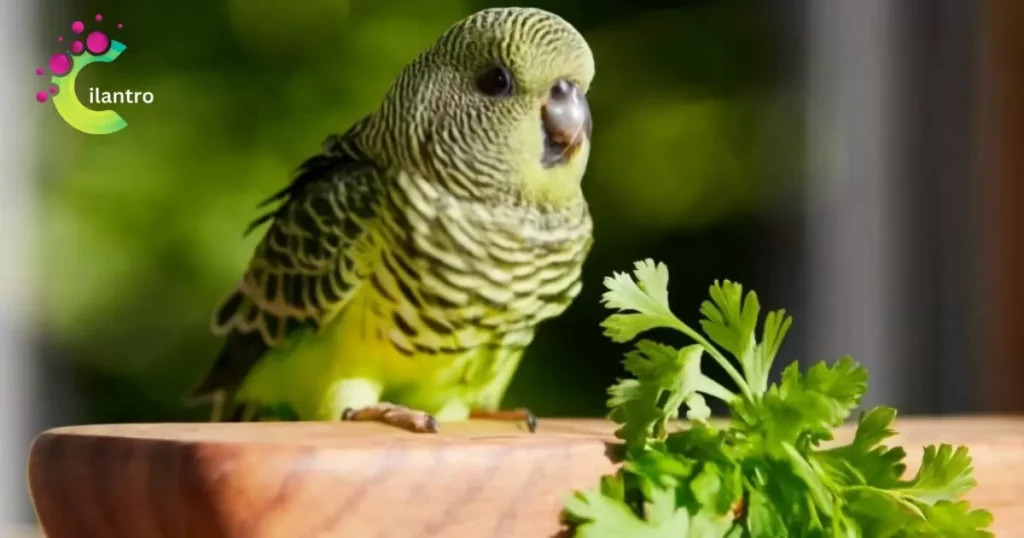
Yes, budgies can safely eat coriander leaves and stems. These parts of the cilantro plant provide a fresh and nutritious addition to a budgie’s diet.
Chopped coriander leaves can be sprinkled on top of their regular food, while small pieces of the stem can be offered for nibbling. As with any new food, introduce cilantro gradually and observe your budgie’s response to ensure they tolerate it well.
What Types of Herbs Are Safe for Parrots?
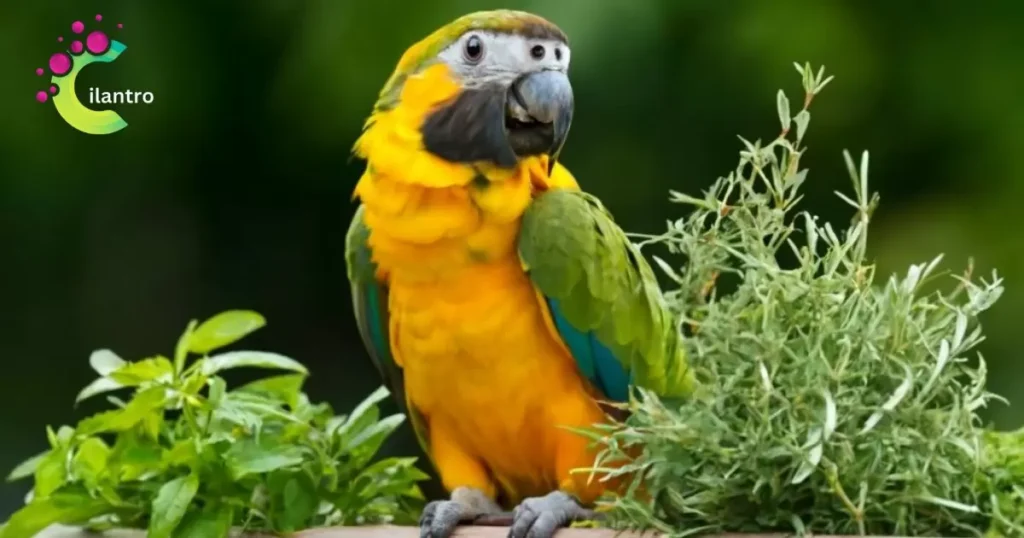
When considering the safety of herbs for parrots, it’s crucial to know which ones are safe and suitable for their consumption.
Rosemary for Parrots: Yes, parrots can eat rosemary. It’s safe for them in moderation and can be a flavorful addition to their diet.
Thyme for Parrots: Thyme is safe for parrots to eat. It provides a variety of nutrients and can be a tasty treat for them.
Parsley for Parrots: Parsley is safe for parrots and is often enjoyed by them. It can be a source of vitamins and minerals in their diet.
Basil for Parrots: Yes, parrots can eat basil. It adds a unique flavor to their diet and can be a healthy herb for them.
Coriander/Cilantro for Parrots: Parrots can eat coriander/cilantro. This herb is safe for them and can be a nutritious addition to their meals.
Dill for Parrots: Dill is safe for parrots to consume. It can contribute to the overall diversity of their diet.
Mint for Parrots: Yes, parrots can eat mint. However, it’s essential to offer it in moderation, as excessive consumption may lead to digestive issues.
Oregano for Parrots: Oregano is safe for parrots. It can provide them with additional flavors and potential health benefits.
Remember, while these herbs are generally safe for parrots, it’s important to offer them in moderation and observe how your parrot reacts to new foods.
Always consult with a veterinarian to ensure that the herbs are suitable for your specific type of parrot.
Can Baby Parrots Eat Kitchen Herbs?
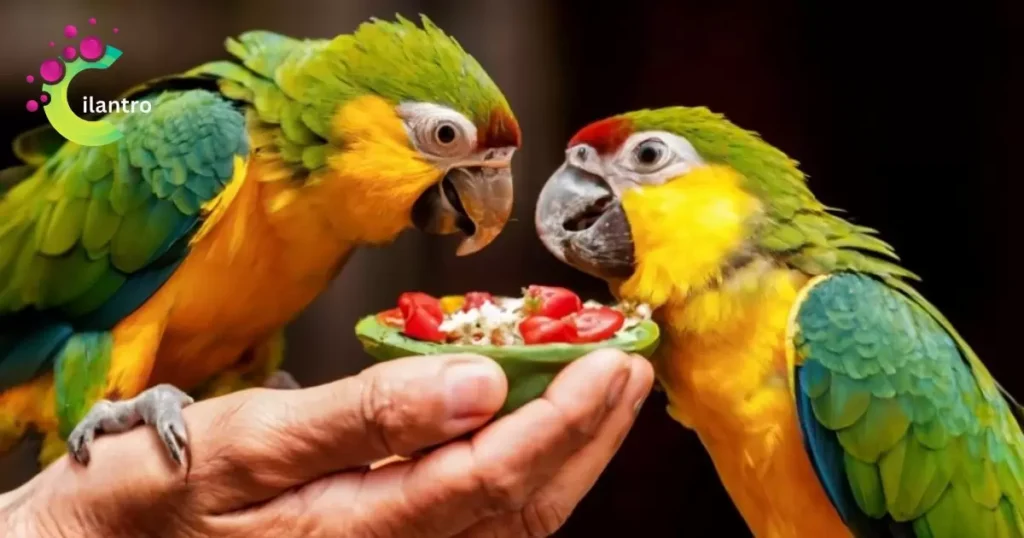
Yes, baby parrots can eat kitchen herbs. It’s important to introduce them gradually. Begin with small amounts to ensure they tolerate the herbs well.
Parrots eat cilantro, and safe options include basil, parsley, and cilantro. Avoid using any herbs with additives or pesticides. Always consult with a vet for specific dietary guidance for your baby parrot.
Ways to Feed Kitchen Herbs to Your Parrots
Feeding kitchen herbs to your parrots can be a delightful and nutritious addition to their diet. Begin by selecting fresh herbs such as parsley or basil, ensuring they are free from pesticides. Parrots eat cilantro is another excellent option to provide a variety of flavors and nutrients for your feathered friends.
Thoroughly wash the herbs and chop them into small, bird-friendly pieces. You can mix these herb pieces with your parrot’s regular food or offer them as a standalone snack. Introduce new herbs gradually to allow your parrot’s digestive system to adapt.
This simple practice not only enhances their diet but also adds a burst of flavor to their daily meals, keeping your feathered friend happy and healthy.
Can Budgies eat Coriander leaves?
Yes, budgies can eat coriander leaves. Coriander is safe and nutritious for them. Make sure to wash the leaves thoroughly to remove any pesticides.
Offer small amounts as part of their varied diet for a happy and healthy budgie.
FAQ’s
Can quaker parrots eat cilantro?
Quaker parrots can safely eat cilantro, as it is non-toxic and can be a nutritious addition to their diet.
Is coriander toxic to birds?
Coriander is not toxic to birds; it is the seed form of cilantro and can be a safe herb for parrots.
What herbs are safe for parrots?
Safe herbs for parrots include basil, parsley, and dill; these can be provided in moderation for added flavor and nutrition.
Can parrots eat mint leaves?
Parrots can eat mint leaves in moderation, as they are generally safe, but excessive amounts may cause digestive issues.
Can I give garlic to my parrot?
It’s advisable to avoid giving garlic to parrots, as it can be harmful to their health.
Conclusion
Cilantro, also known as coriander, is a nutritious herb that can be a valuable addition to a parrot’s diet when fed in moderation. Can parrots eat cilantro? It is rich in vitamins A and K, antioxidants, and essential minerals like potassium, calcium, and phosphorus.
Parrots enjoy cilantro, and its inclusion can contribute to their overall well-being. To ensure safety, it is crucial to provide organic cilantro free from pesticides. Moderation is key, as excessive consumption can lead to nutritional imbalances. The nutritional content of cilantro, as highlighted in a 100-gram serving, includes vitamins A and C, calcium, and potassium.
While cilantro offers potential benefits such as antioxidants for immune support and palatability for picky eaters, caregivers should be aware of potential risks, such as allergic reactions or digestive sensitivity.
Balancing cilantro with other foods is essential to meeting a parrot’s diverse nutritional needs. With proper precautions and moderation, cilantro can be a flavorful and nutritious component of a parrot’s well-rounded diet, supporting their overall health and enjoyment of meals.

Meet our website’s admin, a culinary enthusiast dedicated to curating delectable food ideas. With a passion for gastronomy, they expertly craft and present a diverse array of recipes, tips, and inspirations, making our platform a go-to destination for culinary creativity.
